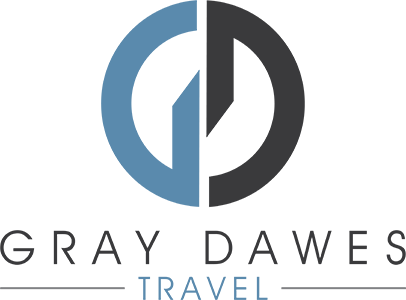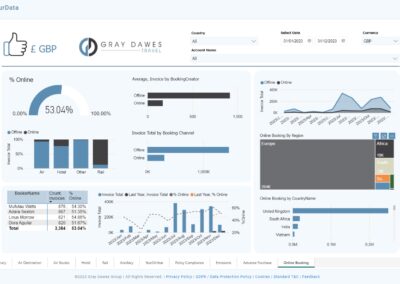WE CAUGHT UP WITH OUR DATA SCIENCE ENGINEER, KARAN PANDYA
With a career in Data Science that started in the supply chain industry and blossomed in the world of business travel, Karan Pandya knows a thing or two about the technical intelligence behind great companies. From researching new technology to solving global business problems with the power of data, Karan has a genuine passion for Data Science and a love for all things machine learning and AI.
In this article, we chat with Karan about his day-to-day responsibilities as a Data Science Engineer at Gray Dawes Travel, his ultimate career highlights, and what it takes to work in Data Science.
Hi Karan. Tell us a bit about what a Data Science Engineer does.
My role is an amalgamation of three different but related disciplines – data engineering, data analytics, and data science.
I am part of a small team, so I get involved at all stages of the Data Science process. I carry out analyses of the data we have at Gray Dawes, and then I’ll engineer that data – whether that be transforming the data into a particular format or ensuring the data is accurate and reliable.
Once all of that is in place, and we have the graphs and charts, that’s when I start the “data science” part of my role which revolves around machine learning and artificial intelligence (AI).
Data Science Stats
%
estimated growth rate for data scientist jobs between 2021 and 2031.*
Every 2 days we create as much information as we did from the beginning of time to 2003**
%
of data scientists use Python as the main coding language**
Tell us a bit about your career before coming to Gray Dawes.
I come from a rural part of India and I did my Engineering in Computer Science schooling there.
My first job was in the Supply Chain industry, not business travel. As part of that team, I mainly worked on behalf of North American clients and Account Managers. Much of my role was Customer Relationship Management (CRM) analysis. I gathered customer insights by analysing their emails and other communications with their Account Manager. It was a totally different role from the one I have now.
I’ve only been at Gray Dawes for a year so the business travel industry is quite new to me, even though I have been in the Data Science field for more than seven years.
Describe a typical work day in your role as a Data Science Engineer
In our first call on Monday, we discuss our plan for the upcoming week. In that call, we go through our high-priority tasks, outline the projects we’re working on, and assign other tasks among ourselves.
Now that Gray Dawes is global, there are an increasing amount of tasks related to international projects that we need to deliver.
Besides working on projects and tasks, I try to set time aside during the week to do research. Before delivering or committing any new, client-facing, tech feature, we spend a lot of time researching it.
We’ll then create a proof of concept for a client or team within our own business, before starting the process of implementing it on a bigger scale.
How has your workday changed from the start of your career until now?
Data Science, as a discipline, is still quite new – there is still so much research happening in the field.
When I first started as a Data Scientist, I was more interested in automation and machine learning. In my past roles, I used to automate small, repetitive tasks that used to slow down the work of other teams. As a company grows, and the workforce increases, these repetitive tasks can pose a problem to the future scalability of the business – a problem that Data Scientists can help solve.
Now, many of these issues are being addressed by artificial intelligence (AI). For example, lots of companies are replacing human customer support with AI chatbots that can take queries and respond with reasonable answers. You no longer have to wait for someone to pick up your call, especially for basic information and troubleshooting steps.
What are your thoughts on AI in the world of work?
I think people are a little bit scared of AI. I hear discussions about how technology is going to take jobs from non-technical people. But it’s not like that.
It’s like when the computer was invented – people thought that was going to take jobs from humans, too. But today computers and mobile phones are an integral part of our day-to-day life. They make our personal and work days easier and give us more room to think as humans.
Personally, I think it’s the same with AI, but I can see it becoming a crucial part of our future. One day everyone will have their own AI personal assistant to help us do our jobs better – not replace us.
The human brain tends to get bored when faced with repetitive or monotonous work. So if you outsource that to AI, you can use the extra time and brainpower you have to think differently and more creatively about whatever field you are in.
One other thing that I have observed with AI since its launch is that companies are rushing to incorporate it into their websites and apps. I think a lot of the time, these companies feel pressure to stay ahead of the game and offer their customers something “shiny” without thinking about how the technology is being used to solve a problem. You need to find a suitable use case for AI in your business, otherwise it just becomes a gimmick.
What is your favourite part of your role and do you have any specific career highlights?
I love the fact I get to work on so many different projects at Gray Dawes. I enjoy exploring the problems faced by Account Managers or the Senior Leadership Team, then researching technology to look for potential solutions.
I also like the challenge of working for a global company. Different regions of the world usually have different data standards, and it’s exciting working alongside clients to bring everything under the same technology architecture, as we do at Gray Dawes. On these projects, we usually develop something as a test before scaling it to a business-wide level. It’s so rewarding to see all of your work come to life around the world.
I love the fact I have full authority over my work, too. I have worked for other Multi-National Companies (MNCs) where the project approval process used to last for weeks. At Gray Dawes, there’s a certain freedom to our work, giving us the time and space to figure out problems creatively.
In terms of career highlights: helping to evolve Gray Dawes into a global business is definitely one of them. A lot of companies do not have a single tech solution across their different international markets. However, I was part of a team that helped develop a way to integrate other companies’ travel data (often in a different format to our own) into our own, single system.
It’s not a “shiny thing” that we can show off, but so much work went into the back-end of these systems. It also set us up well for future growth, as we now have a solid technological process in place for integrating any other potential international acquisitions.
What advice would you give people that want to break into the business travel industry, or want to become a Data Science Engineer?
In India, where I’m from, you need some form of basic education or a basic degree to work in any specific field. However, in the UK, I find it interesting that you can get into a career like Data Science via apprenticeship schemes which require no formal education.
I find it fascinating to find people who have worked in a technical field for 10-15 years who do not have any official schooling and have simply learned their skills in the field. I think this route is the best way of getting into Data Science now.
The business travel industry is an exciting place to be a Data Scientist. Business travel has been around for a long time, and it isn’t going anywhere. It’s an area in which technology is always developing and there’s a very real chance you could be involved in something never seen before. For example, I wouldn’t be surprised to see a completely new mode of transport in the next 10 years or so and I’m 100% certain that the corporate travel industry will be the first to take advantage of it.
There are no limits to the growth of this industry. Even during COVID-19, when the world came to a standstill, people could never have imagined the amount the industry has grown since – it actually seems like it has grown more than ever!
Get Deeper Travel Insights With YourData
YourData provides you with full and detailed reporting, covering every area of travel spend. This ensures complete visibility of your travel programme and highlights any areas of opportunity for improvement.
Powered by Microsoft Power BI, data reports and analytics can be accessed online through a secure individual login or via monthly PDF reports sent to each of your budget holders across the company, helping you monitor performance live against agreed KPI’s.
Finally, a few quickfire questions…
Favourite place you have visited?
Probably Sicily in Italy. I’m the kind of person who likes to read some history of a place before visiting. I found it fascinating how the island broke away from South Africa and floated away to join Europe, and you can see that history in the plants and trees.
The architecture there is also interesting. You have traditional Catholic cathedrals mixed with Islamic buildings (such as madrasas), and these two religions have completely shaped the unique look and feel of this small part of Italy, making it so different from the rest of the country.
It was also where I had my honeymoon, so there’s that too!
Any interesting hobbies or stories?
I love watching sports, especially football and cricket. I play County cricket for the Kenton Cricket Club in Middlesex. I’m not a professional cricketer, but I play in the 3rd Division. Other than that I love to cook. I’d say I was a good cook.
Favourite food and drink?
My favourite food is Misal Pav, an Indian cuisine. It’s a spicy one! In terms of drinks, I will always go for a chilled pint of lager.
Related Articles
Travel Talks – Wellbeing
Discover how to keep your corporate travellers happy and healthy while they’re away on business. In this Travel Talks episode, we explore exactly what Traveller Wellbeing actually is, why it’s so important to both employees and employers, and we present a host of easy to adopt strategies for healthier business trips.
What Does Good Customer Service Look Like?
What does good customer service look like? For Gray Dawes, travel management isn’t just about our award-winning technology or access to comprehensive travel content – even if these are vitally important to a travel programme. In this article, we spoke to our very own Julie Hamstead-Wallis, an experienced Operations Manager, about what makes good customer service, the importance of building rapport, and how Gray Dawes goes the extra mile to help our clients get the most out of their travel.
The Art of Business Networking Worldwide
Networking is more than just handing out business cards and hoping for the best. What works in New York might fall flat in Tokyo. A firm handshake may seal a deal in Germany, but in the Middle East, it’s the trust built over coffee and conversation that truly matters. In this guide to better international networking we help you build more meaningful and longer lasting connections—no matter where your business takes you.
LET'S TALK
Fill in the form below and we'll get back to you as soon as we can.







